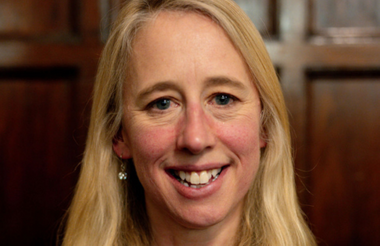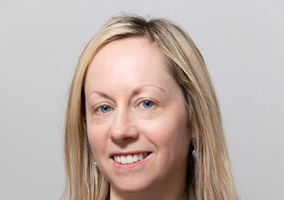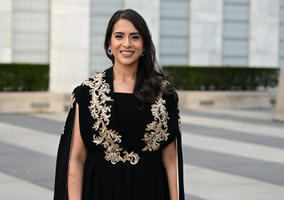Romilly Greenhill became chief executive of NGO membership body Bond in November last year and is “through and through a civil society person”.
She has been involved in the charity sector since being part of the Woodcraft Folk in her childhood, which she describes as “like a hippie version of Brownies and Guides”.
Greenhill also secured a scholarship to go to a United World College when she was 16, the focus of which was “around international understanding, global collaboration, tackling the challenges of the day”.
She began her career at the Ugandan Finance Ministry and then held roles at the New Economics Foundation, ActionAid, and DFID. She was most recently ONE Campaign’s UK director.
Greenhill recalls a time working for DFID, when she went to a World Bank meeting and was in a hotel with people from the UK government.
“I decided it wasn’t as much fun to be in the government hotel as it was to be with the civil society lot,” she says.
“So, I ran off in the evening and hung out with all the civil society activists because I realised that was where my heart was. I’m a great believer in civil society and the power to create change.”
Her early career years made her feel that civil society could “really have an impact” through its advocacy and campaigns for change and justice.
“When this job came up, it seemed like a really exciting opportunity to be very much at the heart of the change and what we can achieve.”
Campaigning
Before joining Bond, Greenhill spent six years at the ONE Campaign, which made her realise the value of public engagement and public campaigning, especially “if you can get real people around the country to come and to meet MPs and to come and take part in marches and lobbies”.
Bond’s members are international development organisations based in the UK and Greenhill says she is concerned about threats to the country’s political and social environment.
“We are finding civic space is closing down and CIVICUS downgraded the UK recently, from ‘narrowed’ to ‘obstructed’.
“It is something that our members are really struggling with both formally on the legislative side, but also informally, with attacks that we’ve seen on charities.
“We do think campaigning is incredibly important, and it’s important that we engage the public and we make our voices heard on the big issues around climate, international development, women’s rights, and so on.
“So, we are finding it a difficult context, but Bond is very much working with our members to try and retain the space for campaigning.”
Nonetheless, she says dialogue with government has improved over the last 18 months since the FCDO decided to create the position of a dedicated development minister who attends cabinet.
“And actually, even the chair of the Charity Commission, has used his platform to say that charities can and should be campaigning,” she says.
Manifesto
Bond recently launched its manifesto, which includes a call on the government for an improved civic space.
Other calls include being a responsible and ambitious development partner and building an equitable and sustainable international financial system that works for people and the planet.
“There’s a recognition at the moment our financial system is really not doing that. We think there’s massive potential but it really needs to work much more effectively.
“It is very important that we recommit to the Sustainable Development Goals and leave no one behind.”
Greenhill says the government must do its “fair share to tackle the global climate and biodiversity crisis”.
“The climate crisis is one of the biggest crises that we face, and also has massive impacts on all of our other agendas, in terms of poverty and so on.”
Bond’s manifesto also includes a commitment around a new approach to UK trade and private sector investment and around stability, security and crisis response.
Locally-led organisations
Greenhill says Bond’s members have had a growing focus on decolonisation and shifting decision-making to the areas where they work in recent years.
“Everything that we do has decolonisation and a locally-led lens. This is work that’s been ongoing for a number of years, but has really come to the fore in recent years.”
There has been a growing recognition around “how power at the moment is very much controlled in donor countries and donor institutions”, with many NGOs still headquartered in wealthier countries.
“There’s been a real recognition that we need to really shift power, resources, control from the global north to partner organisations and countries in the south.
“There’s also been a very strong focus among Bond members on anti-racism, which very closely links to the decolonisation and local leadership agenda.”
Bond has been supporting its members on how to make these changes.
“This is one of those things where you can make a top-level commitment, but actually, how do you do it? How do you move your governance structures? How do you move resources? What does that mean in terms of you as an organisation? And how can we support you to make those changes?
“We are really moving from a charity approach, towards a solidarity and justice approach. So, a lot of work has been done and that’s very welcome. And Bond is really working with our members to continue the momentum and continue the pressure.
“We are technically charities, of course we are, but we like to think of ourselves as wider organisations.”
Communicating work
Greenhill says development charities could improve how they talk about the changes they have made in recent years.
“There’s been a lot of progress in terms of the way we communicate away from this negative messaging towards highlighting the role of people in determining their own futures and being empowered, and the role of outsiders has been very much one of support and solidarity.
“So huge progress has been made, and we still have further to go. And I think we almost need to do a better job in communicating about how we’re communicating.
“I think some people still see us as very sort of top down and I think actually, organisations have moved a long way. But keeping up that momentum is incredibly important.”
Positive fundraising
Greenhill says there has been a shift away from “flies in your eyes” style fundraising campaigns, partly because more positive messaging is more successful.
“People are much more likely to be motivated by stories of hope and positivity than they are negativity, so it does not really work in the short term.
“But it also doesn’t work in the long term because what we have seen around support for international development, is that if you keep going back to the public with those messages, they think nothing ever changes.
“Whereas actually, the reality is that there’s been significant progress”.
More generally, Greenhill is positive about the British public’s willingness to donate to international causes.
The CEO sees this with the public support for Ukraine and in her previous role around people’s enthusiasm for vaccine equity.
“I’m not saying everybody agrees with this, but there’s a lot of public support for doing the right thing and not doing the wrong thing – not being a negative player.”
Difficult time for NGOs
Greenhill says it is a difficult time for NGOs, with Bond’s members “dealing with things like cost-of-living pressures, inflation”.
“The context in terms of Israel and the occupied Palestinian territories, the legacy of Russia’s illegal invasion of Ukraine, these things make the context very difficult partly because it has direct impacts on us”.
The organisation is “very mindful of the context around anti-semitism, racism, islamophobia, that organisations are also grappling with” amid the conflict in the Middle East.
Bond sees its role as supporting organisations to learn from each other and share best practice “because many of our members are dealing with very similar challenges and so there is a really important role that we’re playing in actually bringing people together”.
The organisation is reliant on membership income, so its members’ financial challenges affect its own revenue.
“We face the same cost pressures as everybody else. But we’re lucky to be stable in the current climate, which is fortunate.”
Looking to the future
One of Greenhill’s personal objectives is “about bringing the sector together and ensuring that the sector has more opportunities to learn from each other for mutual support”.
“We’ve had a difficult time in the UK development sector in recent years, and I think there’s really something about taking the opportunity to come together and learn from each other, much more so. And also improving our networks with other sectors.”
Related Articles











